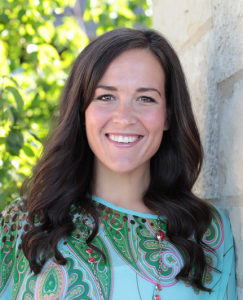I started a series on Biblical womanhood last Thursday with a look at women of the Old Testament. Not commands and laws, but stories about people, what they did and how they did it. It is quite an amazing variety. Today we will look at women of the New Testament. Like the ancient Near East and ancient Israel, first century Galilee, Judea, and the Greek and Roman world were patriarchal cultures. This culture is reflected in the narrative. Still, in the New Testament, even more than the Old Testament, biblical women were not passive wives and mothers staying in the background. Nor were they condemned for their actions (except for the same kinds of failures that condemned men). If there are other specific New Testament examples that we should consider, add them in a comment.
People of Faith
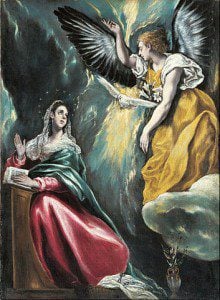 Then Mary said, “Here am I, the servant of the Lord; let it be with me according to your word.” (Luke 1:38)
Then Mary said, “Here am I, the servant of the Lord; let it be with me according to your word.” (Luke 1:38)
When the woman saw that she could not remain hidden, she came trembling; and falling down before him, she declared in the presence of all the people why she had touched him, and how she had been immediately healed. He said to her, “Daughter, your faith has made you well; go in peace.” (Luke 8:47-48, also Matthew 9:20-22, Mark 5:25-33)
Just then a Canaanite woman from that region came out and started shouting, “Have mercy on me, Lord, Son of David; my daughter is tormented by a demon.” … He answered, “It is not fair to take the children’s food and throw it to the dogs.” She said, “Yes, Lord, yet even the dogs eat the crumbs that fall from their masters’ table.” Then Jesus answered her, “Woman, great is your faith! Let it be done for you as you wish.” And her daughter was healed instantly. (Matthew 15:22-28, also Mark 7:24-30)
When the wine gave out, the mother of Jesus said to him, “They have no wine.” And Jesus said to her, “Woman, what concern is that to you and to me? My hour has not yet come.” His mother said to the servants, “Do whatever he tells you.” (John 2:3-5)
This is a group of references, but Mary (in a class of her own) and the two women who came to Jesus for healing were clearly women of faith. They had faith in God and faith in Jesus as God’s prophet … Mary may have known more, but the people who came and heard Jesus in his life probably had no other idea concerning him than that of prophet.
Devout Prophet
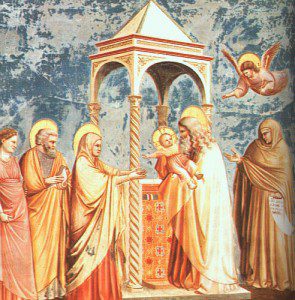 There was also a prophet, Anna, the daughter of Penuel, of the tribe of Asher. She was very old; she had lived with her husband seven years after her marriage, and then was a widow until she was eighty-four. She never left the temple but worshiped night and day, fasting and praying. Coming up to them at that very moment, she gave thanks to God and spoke about the child to all who were looking forward to the redemption of Jerusalem. (Luke 2: 36-38)
There was also a prophet, Anna, the daughter of Penuel, of the tribe of Asher. She was very old; she had lived with her husband seven years after her marriage, and then was a widow until she was eighty-four. She never left the temple but worshiped night and day, fasting and praying. Coming up to them at that very moment, she gave thanks to God and spoke about the child to all who were looking forward to the redemption of Jerusalem. (Luke 2: 36-38)
It is significant that Luke includes two witnesses here – one male, one female – when Mary and Joseph bring Jesus to the temple for his presentation as first born son. Anna is a prophet. What is the role of a prophet? Isn’t it to speak the word of the Lord to the people? In both the Old and New Testament to prophesy (to speak as a mediator between God and humankind or in God’s stead) is an equal opportunity calling, not one limited to men.
Sincere Questioner and Witness
 Many Samaritans from that city believed in him because of the woman’s testimony, “He told me everything I have ever done.” (John 4:39)
Many Samaritans from that city believed in him because of the woman’s testimony, “He told me everything I have ever done.” (John 4:39)
The entire story of the encounter at the well is worth considering (John 4:1-42). Jesus met the woman when she came for water. She had an openness that is a positive contrast to Nicodemus who came at night (John 3).
Connivers
Prompted by her mother, she said, “Give me the head of John the Baptist here on a platter.” (Matthew 14:8, also Mark 6:22-25)
As in the Old Testament not all examples are laudatory.
Followers and Supporters of Jesus
The twelve were with him, as well as some women who had been cured of evil spirits and infirmities: Mary, called Magdalene, from whom seven demons had gone out, and Joanna, the wife of Herod’s steward Chuza, and Susanna, and many others, who provided for them out of their resources. (Luke 8:1-3)
The twelve and some women, three of whom are named, were in the closest circle of followers who were leaving all for Jesus. They traveled with the group, didn’t just support it from afar.
Avid Student of Jesus
 As Jesus and his disciples were on their way, he came to a village where a woman named Martha opened her home to him. She had a sister named Mary, who sat at the Lord’s feet and listened to what he was saying. … “Mary has chosen the better part, which will not be taken away from her.” (Luke 10:38-42)
As Jesus and his disciples were on their way, he came to a village where a woman named Martha opened her home to him. She had a sister named Mary, who sat at the Lord’s feet and listened to what he was saying. … “Mary has chosen the better part, which will not be taken away from her.” (Luke 10:38-42)
The women sat with the men to listen to Jesus. This passage is interesting because Jesus specifically commends this attitude and ordering of priorities. Nor should we neglect Martha who was also a devout follower.
Devout
… “Truly I tell you, this poor widow has put in more than all of them; for all of them have contributed out of their abundance, but she out of her poverty has put in all she had to live on.” (Luke 21:1-4)
Not Quite Getting It (But then neither did the twelve, Mark 9)
Then the mother of the sons of Zebedee came to him with her sons, and kneeling before him, she asked a favor of him. And he said to her, “What do you want?” She said to him, “Declare that these two sons of mine will sit, one at your right hand and one at your left, in your kingdom.” (Matthew 20:20-21)
A worldly understanding of power and prestige afflicts both men and women.
Anointing Jesus
Now while Jesus was at Bethany in the house of Simon the leper, a woman came to him with an alabaster jar of very costly ointment, and she poured it on his head as he sat at the table. (Matthew 26:6-13, also Mark 14:3-9)
And a woman in the city, who was a sinner, having learned that he was eating in the Pharisee’s house, brought an alabaster jar of ointment. … And he said to the woman, “Your faith has saved you; go in peace.” (Luke 7:37-50)
Martha served, while Lazarus was among those reclining at the table with him. Then Mary took about a pint of pure nard, an expensive perfume; she poured it on Jesus’ feet and wiped his feet with her hair. And the house was filled with the fragrance of the perfume. (John 12:1-8)
Each of the gospels has some variation of this incident or these incidents. The versions in Matthew, Mark, and John seem to refer to the same incident, but Luke’s story is quite different, making a different point, and doesn’t seem to mesh with the others completely.
Present at the Cross
But all his acquaintances, including the women who had followed him from Galilee, stood at a distance, watching these things. (Luke 23:49)
Many women were also there, looking on from a distance; they had followed Jesus from Galilee and had provided for him. Among them were Mary Magdalene, and Mary the mother of James and Joseph, and the mother of the sons of Zebedee. (Matthew 27:55-56)
There were also women looking on from a distance; among them were Mary Magdalene, and Mary the mother of James the younger and of Joses, and Salome. These used to follow him and provided for him when he was in Galilee; and there were many other women who had come up with him to Jerusalem. (Mark 15:40-41)
Meanwhile, standing near the cross of Jesus were his mother, and his mother’s sister, Mary the wife of Clopas, and Mary Magdalene. (John 19:25)
The women who traveled with Jesus, the twelve, and the other disciples, were witnesses at the cross to the crucifixion.
The First Witnesses to the Resurrection
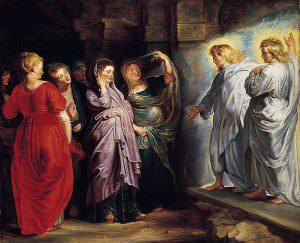 On the first day of the week, very early in the morning, the women took the spices they had prepared and went to the tomb. They found the stone rolled away from the tomb, but when they entered, they did not find the body of the Lord Jesus. … Now it was Mary Magdalene, Joanna, Mary the mother of James, and the other women with them who told this to the apostles. (Luke 24:10)
On the first day of the week, very early in the morning, the women took the spices they had prepared and went to the tomb. They found the stone rolled away from the tomb, but when they entered, they did not find the body of the Lord Jesus. … Now it was Mary Magdalene, Joanna, Mary the mother of James, and the other women with them who told this to the apostles. (Luke 24:10)
Mary Magdalene and the other Mary went to see the tomb. … But the angel said to the women, “Do not be afraid; I know that you are looking for Jesus who was crucified. He is not here; for he has been raised, as he said. … So they left the tomb quickly with fear and great joy, and ran to tell his disciples. Suddenly Jesus met them and said, “Greetings!” And they came to him, took hold of his feet, and worshiped him. (Matthew 28:1-10)
When the Sabbath was over, Mary Magdalene, and Mary the mother of James, and Salome bought spices, so that they might go and anoint him. … But he said to them, “Do not be alarmed; you are looking for Jesus of Nazareth, who was crucified. He has been raised; (Mark 16:1-8)
Early on the first day of the week, while it was still dark, Mary Magdalene came to the tomb and saw that the stone had been removed from the tomb. … When she had said this, she turned around and saw Jesus standing there, but she did not know that it was Jesus. Jesus said to her, “Woman, why are you weeping? Whom are you looking for?” … Jesus said to her, “Mary!” She turned and said to him in Hebrew, “Rabbouni!” (John 20)
All of the Gospels agree on this point. It was the women, Mary Magdalene and others, who traveled with Jesus who were the first to find the empty tomb, to learn that he was risen, and to spread the news.
In a Central Circle with the Disciples
When they had entered the city, they went to the room upstairs where they were staying, Peter, and John, and James, and Andrew, Philip and Thomas, Bartholomew and Matthew, James son of Alphaeus, and Simon the Zealot, and Judas son of James. All these were constantly devoting themselves to prayer, together with certain women, including Mary the mother of Jesus, as well as his brothers. (Acts 1:13-14)
The remaining 11 and certain women comprised the core circle here. They traveled with Jesus in his ministry.
Independently Responsible for Deceit
About three hours later his wife came in, not knowing what had happened. Peter asked her, “Tell me, is this the price you and Ananias got for the land?” “Yes,” she said, “that is the price.” Peter said to her, “How could you conspire to test the Spirit of the Lord? Listen! The feet of the men who buried your husband are at the door, and they will carry you out also.” (Acts 5:7-9)
Sapphira was a co-conspirator with her husband. She wasn’t condemned for his misdeed, but for hers.
Devoted to Good Works and Charity
Now in Joppa there was a disciple whose name was Tabitha, which in Greek is Dorcas. She was devoted to good works and acts of charity. (Acts 9:36)
Business Woman, Head of Household
A certain woman named Lydia, a worshiper of God, was listening to us; she was from the city of Thyatira and a dealer in purple cloth. The Lord opened her heart to listen eagerly to what was said by Paul. When she and her household were baptized, she urged us, saying, “If you have judged me to be faithful to the Lord, come and stay at my home.” And she prevailed upon us. (Acts 16:14-15)
Note in particular that she and her household were baptized, the same phrase used when men are the lead in the story (Cornelius and the head of the guard for example.)
Fellow Traveler, Witness with Paul
Paul said farewell to the believers and sailed for Syria, accompanied by Priscilla and Aquila. (Acts 18:18)
He began to speak boldly in the synagogue; but when Priscilla and Aquila heard him, they took him aside and explained the Way of God to him more accurately. (Acts 18:26)
Greet Priscilla and Aquila, my co-workers in Christ Jesus. They risked their lives for me. Not only I but all the churches of the Gentiles are grateful to them. (Romans 16:3-4)
Aquila and Priscilla greet you warmly in the Lord, and so does the church that meets at their house. (1 Corinthians 16:19)
Greet Priscilla and Aquila and the household of Oneisiphorus. (2 Timothy 4)
This couple clearly had a role in the early church. Both of them were involved and are emphasized in every story.
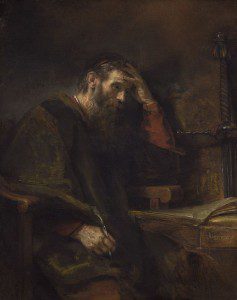 The letters of Paul could be quite personal, especially in the final greetings at the end. Priscilla and Aquila figured here, but so did many others. These personal greetings include an interesting array of both men and women. Here we are concerned with the women.
The letters of Paul could be quite personal, especially in the final greetings at the end. Priscilla and Aquila figured here, but so did many others. These personal greetings include an interesting array of both men and women. Here we are concerned with the women.
Deacon and Benefactor
I commend to you our sister Phoebe, a deacon of the church in Cenchreae. I ask you to receive her in the Lord in a way worthy of his people and to give her any help she may need from you, for she has been the benefactor of many people, including me. (Romans 16:1-2)
A deacon and a benefactor. Quite the reference from Paul! This recommendation probably means that Phoebe delivered Pauls letter to the church in Rome. N.T. Wright in his Commentary on Romans notes:
The implication is that Phoebe is a businesswoman who is able to travel independently, and for Paul to trust her with a letter like this speaks volumes for the respect in which she was held, so it is no surprise that she is a deacon in the church. … She was in a position of leadership, and Paul respected here as such and expected the Roman church to do so as well. … The word “benefactor” means much more, in Paul’s world, than simply “she has been a great help” (NIV): benefaction and patronage were a vital part of the culture, and this makes Phoebe someone to be reckoned with socially and financially and a leader – of whatever sort – in her local church. (p. 761-762)
In this section Wright’s complaints with the NIV on the word “deacon” (the material bypassed by the first ellipse in the quote) and “benefactor” relate to NIV1984. The 2011 update uses deacon and benefactor.
Hard Workers in the Lord
Greet Mary, who worked very hard for you. (Romans 16:6)
Greet Tryphena and Tryphosa, those women who work hard in the Lord. Greet my dear friend Persis, another woman who has worked very hard in the Lord. (Romans 16:12)
Outstanding Among the Apostles
Greet Andronicus and Junia, my fellow Jews who have been in prison with me. They are outstanding among the apostles, and they were in Christ before I was. (Romans 16:7)
Here Wright comments that, for Paul, an apostle was one who witnessed the risen Christ. “Junia is thus one of the female “apostles,” the only one so called; though presumably others, such as Mary Magdalene, were known as such as well.” (p. 762)
A Woman of Standing
My brothers and sisters, some from Chloe’s household have informed me that there are quarrels among you. (1 Corinthians 1:11)
Presumably another woman of standing. Members of her household traveled abroad.
Contending for the Gospel (and at odds)
I plead with Euodia and I plead with Syntyche to be of the same mind in the Lord. Yes, and I ask you, my true companion, help these women since they have contended at my side in the cause of the gospel, along with Clement and the rest of my co-workers, whose names are in the book of life. (Philippians 4:2-3)
Hostess (perhaps more)
Give my greetings to the brothers and sisters at Laodicea, and to Nympha and the church in her house. (Colossians 4:15)
Recipient of 2 John
To the lady chosen by God and to her children, whom I love in the truth—and not I only, but also all who know the truth (2 John 1)
Several things are apparent from this list.
- Anna, the prophet, was one of the two to welcome the Messiah in the temple.
- Jesus preached to and taught both men and women. Mary was welcome to learn with the others.
- Women played a prominent role in band of people who traveled with Jesus during his earthly ministry. The twelve were all men, and there is important symbolism in the selection of twelve. But it is not clear that inner circle of followers were all male. Women were provided support, traveled along, were at the cross, witnessed the resurrection, and were with the 12 in the upper room before Pentecost, received the Holy Spirit.
- Women, including women of substance, played an important role in the early church.
These women are multidimensional people capable of almost anything, good or bad. All of the images were taken from Wikipedia and again convey as much or more about the artist and his culture as they do about the subjects.
Is there any example you would add to the list?
If you wish to contact me directly you may do so at rjs4mail[at]att.net.
If interested you can subscribe to a full text feed of my posts at Musings on Science and Theology.

_-_Annunciation_-_Google_Art_Project-220x300.jpg)

